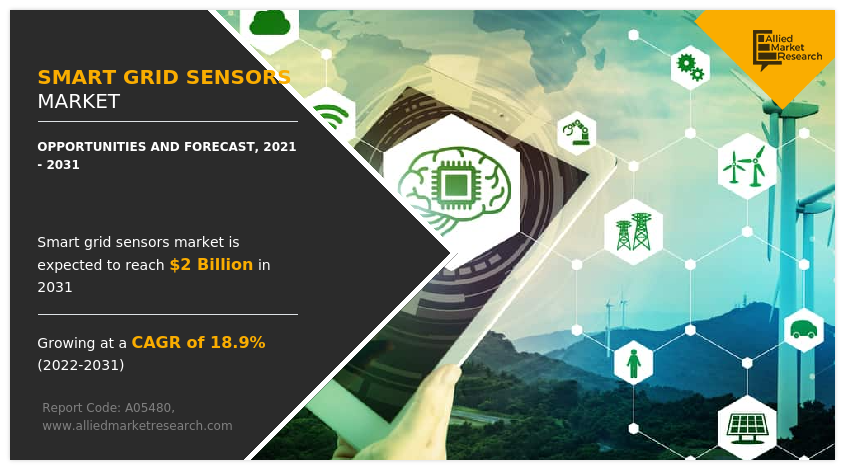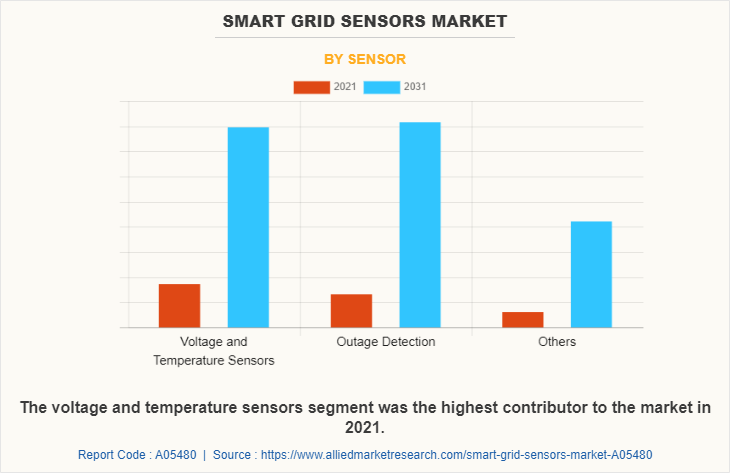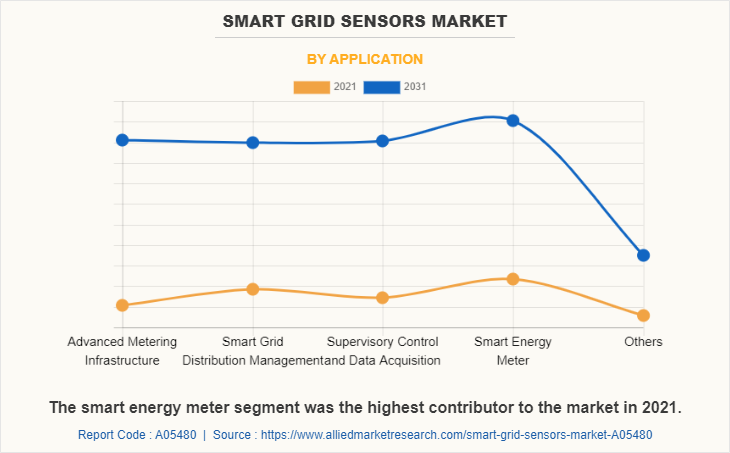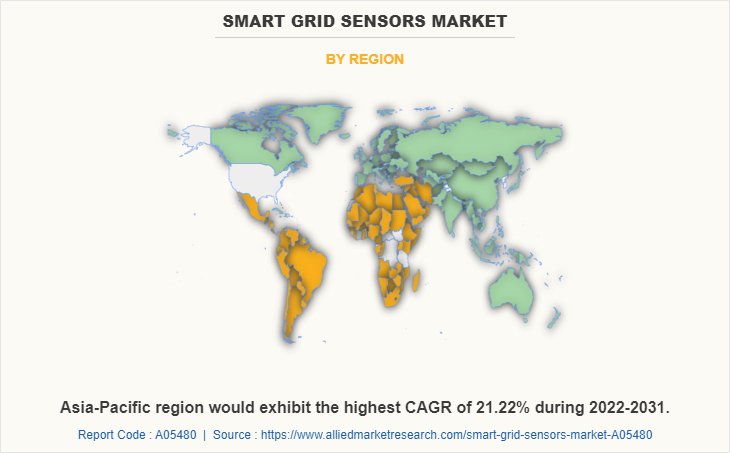Smart Grid Sensors Market Statistics - 2031
The global smart grid sensors market was valued at $364.7 million in 2021, and is projected to reach $2 billion by 2031, growing at a CAGR of 18.9% from 2022 to 2031.
A smart grid sensor is a device that is used to collect data on the electric power grid. These sensors can measure a wide range of parameters, such as voltage, current, temperature, and power consumption. The data collected by these sensors can be used to improve the efficiency, reliability, and security of the electric power grid. Smart grid sensors can be connected to the Internet, allowing the data they collect to be transmitted to a remote location for monitoring and analysis. Some smart grid sensor systems use advanced analytics and machine learning algorithms to identify patterns and anomalies in the data, which can help utilities to detect and prevent issues such as power outages and equipment failures.

Smart sensors in smart grids provide real-time data and status of bidirectional flows of energy for monitoring, protection, and control of grid operations to improve reliability and resilience. Smart sensors in smart grids provide real-time data and status of bidirectional flows of energy for monitoring, protection, and control of grid operations to improve reliability and resilience.
Significant factors that impact the growth of the smart grid sensors market size include a surge in the need for energy-efficient and sustainable solutions. Moreover, a supportive regulatory framework of governments worldwide to promote the deployment of smart grids is expected to drive the ultrasonic air bubble detectors market growth. However, security concerns and the lack of awareness with respect to the availability of smart grid solutions might hamper the growth of the market. On the contrary, the ongoing smart city projects in developing countries set potential growth opportunities for the smart grid sensors industry.
Modern solutions that are based on dependability, adaptability, and efficiency can be implemented using software like supervisory control and data acquisition (SCADA), which presents numerous growth opportunities. Various smart city projects in developing nations produce sustainable economic growth and improved quality of life through the implementation of various fields like technology, mobility, the environment, living lifestyle, and government policies. In addition, opportunities for the smart grid sensors market growth may arise during the projected period owing to extensive ongoing research into smart solutions.
However, high costs associated with deploying smart grid sensors and the complex integration of them with other systems, can act as a restraint on the growth of the smart grid sensors market share in the future.
Segment Overview
The smart grid sensors market is segmented into Sensors and Applications.
Sensor, the market is divided into voltage and temperature sensors, outage detection, and others. The voltage and temperature segment was the highest revenue contributor to the market in 2021.
Worldwide, a rapid rise in demand for electricity and effective power transmission and distribution is being recorded as the trend of electrification continues to make deeper inroads. The demand for electricity worldwide is predicted to rise at a rate of 2.1% per year until 2040, which is twice as fast as the overall demand for primary energy, according to a study conducted by the International Energy Agency (IEA).

By application, the market is divided into advanced metering infrastructure, smart grid distribution management, supervisory control and data acquisition, smart energy meters, and others. The smart energy meter segment was the highest revenue contributor to the market in 2021.

Region-wise, the smart grid sensors market trends are analyzed across North America (the U.S. and Canada), Europe (UK, Germany, France, Spain, Italy, and the rest of Europe), Asia-Pacific (China, Japan, India, South Korea, Australia and rest of Asia-Pacific), and LAMEA (Latin America, the Middle East, and Africa).

Competitive Analysis
The key players profiled in the report include ABB, GE Grid Solutions, Siemens, Landis+Gyr, Trilliant, Itron, S&C Electric, Sentient Energy, Inc., Aclara Technologies LLC, and Echelon Corporation are provided in this report. The major smart grid sensor providers are inclined to invest heavily in product innovation, research, and development in energy and smart infrastructure.
In January 2021, Schneider-Electric attained DC Systems BV, which is a major distributor of smart systems, which aided the company in promoting innovations in electrical distribution.
In February 2021, Hitachi ABB Power Grids launched a smart digital substation. This new offering brings the latest in digital substation technology with the unique prescriptive, predictive, and prognostic capabilities of the company’s Lumada Asset Performance Management (APM) solution.
Key Benefits for Stakeholders
- This report provides a quantitative analysis of the market segments, current trends, estimations, and dynamics of the smart grid sensors market analysis from 2021 to 2031 to identify the prevailing smart grid sensors market opportunities.
- The market research is offered along with information related to key drivers, restraints, and opportunities.
- Porter's five forces analysis highlights the potency of buyers and suppliers to enable stakeholders to make profit-oriented business decisions and strengthen their supplier-buyer network.
- An in-depth analysis of the smart grid sensors market overview assists in determining the prevailing market opportunities.
- Major countries in each region are mapped according to their revenue contribution to the global market.
- Market player positioning facilitates benchmarking and provides a clear understanding of the present position of the market players.
- The report includes an analysis of the regional as well as global smart grid sensors market trends, key players, market segments, application areas, smart grid sensors market forecast, and market growth strategies.
Smart Grid Sensors Market Report Highlights
| Aspects | Details |
| Market Size By 2031 | USD 2 billion |
| Growth Rate | CAGR of 18.9% |
| Forecast period | 2021 - 2031 |
| Report Pages | 330 |
| By Sensor |
|
| By Application |
|
| By Region |
|
| Key Market Players | ABB, Trilliant, Echelon Corporation, Landis+Gyr, ge grid solutions, Aclara Technologies LLC, Siemens, s&c electric company, Itron, Inc., Sentient Energy, Inc. |
Analyst Review
The smart grid sensors market exhibited development potential across industrial and commercial sectors. Furthermore, the integration of renewable energy sources such as solar and wind power into the electric power grid is increasing the need for smart grid sensors to monitor and control these sources is driving the growth of the smart grid sensors market through digital transformation.
The smart grid sensors market is highly competitive, owing to strong presence of existing vendors. The market vendors are investing substantially in R&D and skilled workforce and are anticipated to gain a competitive edge over their rivals. The competitive environment in this market is expected to further intensify with an increase in technological innovations, product extensions, and different strategies adopted by key vendors.
The demand for smart grid sensors in smart energy meter is estimated to expand at a rapid pace during the forecast period due to an increase in government policies and regulations promoting the deployment of smart grid technologies. Moreover, urbanization and smart city initiatives around the world have increased the need for efficient and reliable energy management, which has created opportunities for the smart grid sensors market.
The key players profiled in the report include chip antenna market players, such as ABB, GE Grid Solutions, Siemens, Landis+Gyr, Trilliant, Itron, S&C Electric, Sentient Energy, Inc., Aclara Technologies LLC and Echelon Corporation.
The Smart Grid Sensors Market is expected to grow at a CAGR of 18.86% during the forecast period.
The major applications of Smart Grid Sensors are considered to be in advanced metering infrastructure, smart grid distribution management, supervisory control & data acquisition, smart energy meter and others.
Asia-Pacific is estimated to be the largest regional market for Smart Grid Sensors Market.
The global Smart Grid Sensors Market was valued at $364.7 million in 2021
The top companies to hold the Smart Grid Sensors Market share are ABB, GE Grid Solutions, Siemens, Landis+Gyr, Trilliant and others.
Loading Table Of Content...



